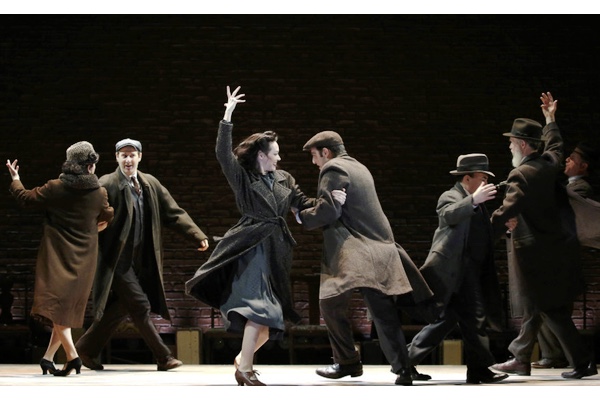A Play about a Play? Yes, When the Play Is About Jews and Gays and the Police Shut It Down

In 1907, Sholem Asch wrote God of Vengeance, a play about a prostitute who falls in love with her boss’s daughter. It became a hit in Europe and remained one for years. It was staged again in New York in 1922, first at a Yiddish Theater and then at an Off Broadway Theater. No one seemed to care about the two young women who spend much of the end of the second act in deep kissing and tender caresses, sure fire no-nos on stage in that era. Then the play moved to Broadway, where the rules were different. The police raided the theater where the drama was playing, closed the show after one night and arrested several people in the show on charges of indecency.
Now, in 2017, there is Indecent, a play about that drama and its closure. The play, written by Paula Vogel, is not just about the police shut down of the show. It covers the entire Jewish movement to the United States, the history of the Yiddish theater, immigration and, most importantly, the unfortunate decision of a number of people involved in the 1922 play to return to Nazi Germany in 1938. The play, which opened last night at the Cort Theater, on West 48th Street, in New York, is a deep and emotional story that focuses the spotlight, yet again, on the historic persecution of the Jews, in both Europe and America. It is a moving story about a dark chapter in the history of the world and a sad chapter on Broadway, too, in that no one stepped forward to help the Jews in God of Vengeance.
There is a lot of history in the play, especially about the theater world in the roaring twenties. Jewish groups in New York relied on the Yiddish Theaters, and there were many, where plays could be produced in Yiddish. Few ever moved to mainstream houses, but God of Vengeance did and with great fanfare. The play’s lesbian love story was toned down, but the kissing scenes were left in. A large audience turned out for the first and only performance. The mystifying thing is that the writer and cast of the play did not seem to think the two lesbians will bring them trouble in what was the very first play about lesbians on Broadway, and, well, they should have thought that it would.
The end of the play is riveting. The acting troupe from the Yiddish theater regroups in Poland during the Holocaust and decides to stage the play again in an attic in a ghetto, taking a chance that the police, who hated homosexuals in that country, would somehow not catch them. The final scenes are savage and will break your heart. It is the grand finale of a well written play that travels from one stage of desperation to another.
The strength of the play is that it moves along at one level, the production of the drama, and then moves to a second, the police shut down, and then to a finale in the ghetto. The writer, and director, ramp up the tension as the story unfolds over two continents.
Director Rebecca Taichman gets memorable performances from Richard Topol as Lemml, the stage manager who is the central character in the saga, and Katrina Lenk, Mimi Lieber, Max Gordon Moore Tom Nells, Steven Rattazzi and Adina Verson as the “actors.”
Indecent is especially appealing today because Jews in the Middle East, America and, well, everywhere, are still victims of prejudice. It is appealing, too, because of the never-ending struggles of homosexuals. Their lives have become better, for sure, over the last decade or so but America still has a ways to go.
Indecent is a stinging reminder of prejudice in the past and tells a fine story of a world in the 1920s with its jazz music, Charleston dancers and strong economy that seemed so beautiful and glamourous and yet was beset with numerous problems as people of all races and religions tried to get along with each other.
The play is a good one, but it has some problems. The first half of it trudges along very, very slowly. Then, in the middle, it finally picks up steam. It is not made clear whether the police thought the lesbians were obscene or that the police just wanted to shut the play down because it was about Jews. The dark set is rather spartan and unappealing.
Even so, the drama packs a terrific emotional wallop.
PRODUCTION: The play is produced by Daryl Roth, Elizabeth I. McCann, Cody Lassen and others in association with the Yale Repertory Theater, the La Jolla Playhouse and the Vineyard Theater. Sets: Riccardo Hernandez, Costumes: Emily Rebholz, Lighting: Christopher Akerlind, Sound: Matt Hubbs, Projection Design: Tal Yarden. The play is directed by Rebecca Taichman. It has an open run.